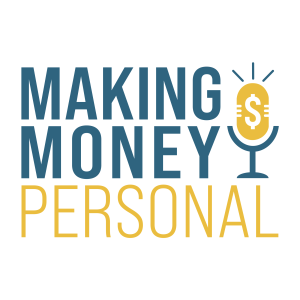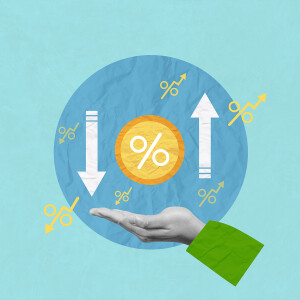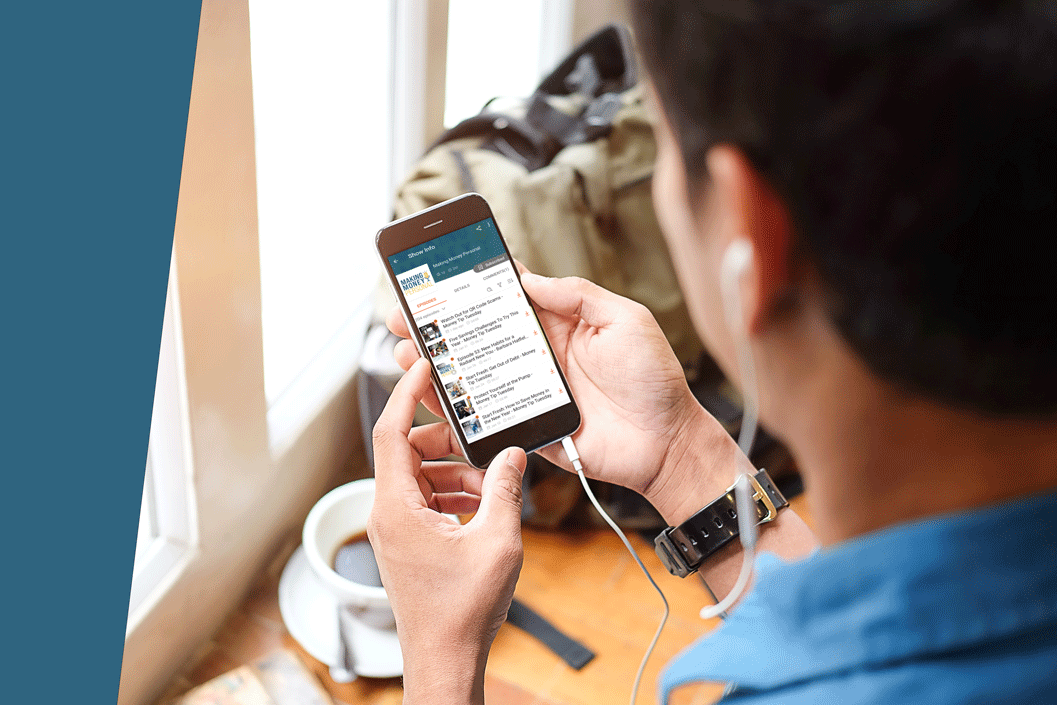Episodes

Tuesday Oct 22, 2024
Top 5 Tips to Save Money This Holiday Season - Money Tip Tuesday
Tuesday Oct 22, 2024
Tuesday Oct 22, 2024
It’s that magical time of year again—the decorations are coming out, the music is playing in the malls, and for us in NH, cold crisp winter is in the air. Nestled in all of this is holiday shopping! Today, we’re going to share 5 tips to help you save money and reduce financial stress this season.
Links:
Learn more about Triangle's Goal Builder tool
Check out TCU University for more financial education tips and resources!
Follow us on Facebook, Instagram and Twitter!
Learn more about Triangle Credit Union
Transcript:
Welcome to Money Tip Tuesday from the Making Money Personal podcast!
Let’s be real: this is a favorite time of year for so many, but this season does not come without financial strain and stress. We have five top tips to help save you money this shopping season.
Tip #1 – Make a list! Write down everyone you plan to give gifts to, including family, friends, neighbors, coworkers, your mail carrier…you get the picture! Then put a dollar figure next to each name.
Once you complete the list (and associated dollar figures), add it all up to see if it hits the mark in your holiday spending budget. If your budget can handle the gifts and amount, then let the shopping begin; however, if your budget is taking a big hit and can’t cover the expenses of your gift giving list, it’s time to set some price limits to keep your holiday budget on track!
You can write out your list with a pencil and paper or use an Excel spreadsheet, which is what we recommend. Excel will allow you to modify the list easily.
If you are in the predicament of having way too many names and dollars than your budget allows, here are some ways to limit your list:
Simply cut the budget by making some baked goods or a cute home-made craft for everyone other than your immediate family.
If you have a sizable family, suggest a Yankee Swap or drawing names and make sure you set spending limits – this is often an approach many use especially for siblings.
Tip #2 – Use sleuth shopping techniques
When you’re out shopping, don’t buy the item without searching for a better deal. Using your phone, do a quick online search to see if you can find it elsewhere at a lower price.
Online shopping has revolutionized sleuth shopping – with a simple Google search you can find the best prices for almost any product! Use this to your advantage! Once you find the best price—show it to the store representative and ask for a price match. If they want your business, they will make every effort to match the price you found online.
Shoppers are more comfortable with this technique if they have the time, so start shopping early! One of the surest ways to overspend is to wait until the last minute and buy all your gifts in a rush. Not only are you more likely to overspend, but it also makes an already stressful time of the year even more so, which brings us to…
Tip #3 – Start early and save money, time, and aggravation
Set a start date and a wrap-up date (pun intended) – the earlier you finish, the more time you will have to enjoy the holiday festivities without the stress! Another benefit of starting early is establishing a longer period to save money for gift giving, which will reduce the impact on your monthly budget. And speaking of saving money…
Tip #4 – Use Your Goal Builder Tool
Check your financial institution for goal building tools and use them to save money for special occasions, like holiday shopping. For example, Triangle Credit Union’s Goal Builder tool allows you to set a goal, the amount you want to save, your start and end dates, and there’s even an auto save option which allows you to select the frequency of how often you want to put money in your savings account.
For more information on this option, check out trianglecu.org/bank/tcu-go-services or our blog on Triangleuniveristy.org.
Goal builder tools allow you to save money over a period of time which reduces a load of stress. The principle of a Goal Builder tool is very much the same as the old Christmas Clubs where you would put money in an envelope or deposit into an allocated account at your financial institution. With Goal Builder, saving is just easier and more convenient because it’s all within your online or mobile banking platform.
Tip #5 – Buy the Product, Not the Marketing
For some of us, the latest and greatest tech is very important! For the rest of us, the latest and greatest tech isn’t important at all. If the people on your list are more interested in features than fanfare, you can save big on buying last year’s model for tech items, such as phones, TVs, audio equipment, etc.
But buyer beware: You may have to sleuth shop a little more to find the earlier models simply due to retail-mania where retailers want to showcase the latest and greatest, so you overspend! Sadly, we can buy into this and spend hundreds on insignificant upgrades and features that we’ll never use or miss. To look for earlier models on phones, I use eBay (just make sure you purchase from a reliable and credible reseller).
And here’s a bonus tip: Doorbuster deals are not all that! You probably started hearing about “doorbuster” deals already, but these specials rarely pay off! A lot of retailers simply markup items to give you the illusion you are getting a real deal at 50% off. Don’t fall for this—rather look for the everyday deals, save early and shop early, and stick to your plan and your budget!
That wraps up today’s Money Tip. If you have any questions or comments or have suggestions on future topics and tips, please email us at tcupodcast@trianglecu.org.
For more great content, remember to subscribe to the Making Money Personal podcast wherever you listen to podcasts and follow us on Facebook.
Have a great day!

Thursday Oct 17, 2024
Thursday Oct 17, 2024
Starting and building a business can be intimidating and challenging, especially for women and minority business owners. As these challenges are illuminated, many organizations step up to help reshape the economic landscape and encourage successful outcomes for future leaders.
In this episode, we're featuring women leaders from two organizations working hard to empower and build a better future for generations to come.
Links:
Girls Inc. NH website: Girls Inc. | Inspiring All Girls to be Strong, Smart & Bold (girlsincnewhampshire.org)
Learn more about the Girls Inc Raffle: Strong Smart & Bold Raffle | Inspiring All Girls to be Strong, Smart & Bold (girlsincnewhampshire.org)
Explore resources and learn more about the REDC: Regional Economic Development Center | Raymond NH (redc.com)
Explore the REDC and Kiva webinars: Kiva | REDC
Check out TCU University for more financial education tips and resources!
Follow us on Facebook, Instagram and Twitter!
Learn more about Triangle Credit Union

Tuesday Oct 15, 2024
Important Reasons to Bank with a Credit Union - Money Tip Tuesday
Tuesday Oct 15, 2024
Tuesday Oct 15, 2024
When it comes to financial institutions, we often select where to bank based on a particular product or service, but there are other reasons why choosing a financial institution is an important decision.
Credit unions offer up an ethical banking option for those looking to do business with companies that value people and their social impact as much as their own growth.
Links:
Learn more about Conscious Capitalism
Check out TCU University for more financial education tips and resources!
Follow us on Facebook, Instagram and Twitter!
Learn more about Triangle Credit Union
Transcript:
Welcome to Money Tip Tuesday from the Making Money Personal podcast.
There’s a growing interest among consumers to support and do business with ethical companies, and there are many companies that want to be ethical and still maintain steady business growth.
Because of this, there’s a movement spreading called conscious capitalism, promoting the idea that businesses within a capitalist system can seek financial growth and profits while at the same time maintaining strong ethics and a powerful focus on its social and environmental impact.
The idea of conscious capitalism came from Whole Foods Co-founder John Mackey and author/marketing professor Raj Sisodia.
They wanted to spread the idea that businesses can pursue growth and profits in a way that also serves the interest of all stakeholders rather than just corporate management groups and shareholders.
The two men co-authored a book and eventually developed the organization Conscious Capitalism, Inc.
Since then, many high-profile companies have joined the movement, such as Starbucks, Whole Foods, Trader Joes, Alphabet and others.
When businesses adopt this philosophy, they choose to recognize the four principles of conscious capitalism listed out by Mackey and Sisodia. These four principles are: Higher Purpose, Stakeholder Orientation, Conscious Leadership, and Conscious Culture.
By incorporating these principles into their internal and external operations, businesses hope to improve customer and employee relationships, build brand loyalty with customers drawn to their mission, and engage more effectively with their communities.
If you’re looking for businesses practicing a similar philosophy that seeks to impact their community and their environment in an ethical manner, look to local credit unions.
Credit unions have woven the concept of providing quality financial products and services with a conscious, ethical mindset.
Through cooperative finance, credit unions shine in many ways as a satisfactory way to access quality banking services and products while also making a positive impact on the community. Here are some of the top reasons to consider a credit union as your trustworthy and ethical financial institution.
Great products: First, people want great financial products that fit their needs. They want capabilities that work well for their lifestyle and financial tools they can use to live their best life. Tools like mobile banking, contactless payment solutions, mobile wallet capabilities, and online applications are all features many people are looking for from a bank. The hunt for low fees and great rates – high deposit and low lending rates- also draws people to a great financial institution. Credit unions have continued to roll out all the digital tools and capabilities that serve all kinds of financial needs. They also historically offer better lending and deposit rates than commercial banks, making the credit union choice great for affordable auto loans and mortgages.
Social responsibility: Second, many people care a lot about how socially responsible their financial institution is. They want to know their institution cares about people more than just making a profit. Credit unions do! They make a strong effort to participate in efforts that financially benefit their communities and focus on the social impact of their decisions. They consider their constituents' economic and environmental factors and strive to offer products and services that help underserved groups in the communities they serve.
Customer service: Who wants to bank with an institution that only sees names as numbers? Being recognized and known as an individual is a key to member satisfaction. Credit unions pride themselves on customer service. Their member focus creates a communal atmosphere where every member is recognized and listened to. Members are the credit union's foundation, and time after time, many have shared how they love that they're treated like family when they walk in.
Local involvement: No one knows the local community better than a credit union. It's made up of people living and working within the community, so it makes a dedicated effort to participate in local activities and events through sponsorships and engagement. Credit unions love to give back and show support to all the citizens striving to improve their local environment. It's essential for many people to know that their bank is committed to the many people living and working within the community, and credit unions do that all year round.
If there are any other tips or topics, you’d like us to cover, let us know at tcupodcast@trianglecu.org. Like and follow our Making Money Personal FB and IG page and look for our sponsor, Triangle Credit Union on social media to share your thoughts.
Thanks for listening to today’s Money Tip Tuesday and be sure to check out our other tips and episodes on the Making Money Personal podcast.
Have a great day!

Tuesday Oct 08, 2024
Recognizing and Avoiding Common AI Scams - Money Tip Tuesday
Tuesday Oct 08, 2024
Tuesday Oct 08, 2024
Artificial Intelligence, commonly referred to as AI, is becoming more and more prominent in our everyday lives. Unfortunately, AI scams are becoming more common due to this technological advancement. Here are some AI scams to look out for and how you can avoid them.
Links:
Additional AI scam education and resources:
https://www.experian.com/blogs/ask-experian/what-are-ai-scams/
A Safe Word Can Protect against AI Impostor Scams | Scientific American
https://reportfraud.ftc.gov/
https://www.identitytheft.gov/
Check out TCU University for more financial education tips and resources!
Follow us on Facebook, Instagram and Twitter!
Learn more about Triangle Credit Union
Transcript:
Welcome to Money Tip Tuesday from the Making Money Personal podcast.
AI scams can take many different forms. The first type we'll talk about is voice cloning. AI can take clips of audio from a person and clone their voice. Fraudsters use this clone voice to say whatever they want. They can then use the cloned voice to impersonate the person the voice belongs to and call people. They might be impersonating a celebrity or politician, asking for money to donate to a charity, but the money goes to the fraudsters.
Fraudsters can get even more personal with AI voice cloning. They can clone the voice of someone you know. It may sound like a friend or relative asking for financial help, but it could also be AI. A good way to protect yourself from scams like this is to create a safe word with friends and family. This safe word is something only you and the other person know. If you get a suspicious-sounding phone call, ask them for the safe word. If they can't answer correctly, you know it's a fraudster.
The next form of AI scams is deepfakes. Deepfakes are images or videos created by AI that can look and sound like anyone. This can be a very dangerous tool, allowing scammers to impersonate anyone they want. Like the voice clones, scammers can be celebrities or politicians asking to donate money or even someone you know and love asking for money.
There are some ways to detect a deepfake. Look at the skin of the person. Does it look very polished and smooth? It may be AI-generated then. Does the skin tone of the face match the rest of the body? If it doesn't, the video or image may have been face-swapped. However, there are prompts that scammers can put in to fix this. Look at the shadows and lighting. Is it consistent? Usually in deepfakes, the focus is on the person, not the background. If the background doesn't look real, it probably isn't.
You can also look at the mouth of the person in the questionable video. Does the audio match up with the lip movements? Do the person's teeth look blurry? These are both ways to see if it is a deepfake or not.
You can also just use common sense to spot a deepfake. Is this something that the person would be saying or doing? If it's someone you know, reach out to them and ask them about it.
If you are the victim of an AI scam, here are some things you should do. First, if you paid a scammer, try to get it back. Contact your financial institution and see if they can stop the transaction from going through. Next, secure all your accounts if you think they might be at risk. Reset all passwords and set up a multi-factor authentication if you haven't already. Report the scam to the Federal Trade Commission, or FTC for short. This will allow the FTC to track scam trends, warn others who might be at risk, and charge scammers with their crimes if caught. If you think the AI scam was after stealing your identity, you can also report it to the FTC.
With the rise of AI, it's more important than ever to be vigilant and always think before sending someone money online. It's also important to educate people who might be less tech-savvy so they don't get scammed.
If there are any other tips or topics you'd like us to cover, let us know at tcupodcast@trianglecu.org. Also, remember to like and follow our Making Money Personal Facebook and Instagram to share your thoughts. Finally, remember to look for our sponsor, Triangle Credit Union, on Facebook and LinkedIn.
Thanks for listening to today's Money Tip Tuesday. Check out our other tips and episodes on the Making Money Personal podcast.

Tuesday Oct 01, 2024
Budget Friendly Grocery Tips - Money Tip Tuesday
Tuesday Oct 01, 2024
Tuesday Oct 01, 2024
If you've been feeling that the cost of groceries seems too expensive and your budget is taking a hit, it may be time to reevaluate your grocery shopping strategy. Fortunately, there are a variety of ways to cut down on the amount of money you’re spending on your weekly grocery bill.
Links:
USDA Seasonal Produce Guide
Explore meal-planning apps:
Yummly
Mealime
Meal Prep Pro
Check out TCU University for more financial education tips and resources!
Follow us on Facebook, Instagram and Twitter!
Learn more about Triangle Credit Union
Transcript:
Welcome to Money Tip Tuesday from the Making Money Personal podcast.
The price of groceries continues to climb for many Americans across the country. If you’re one of those noticing the rise in the cost of groceries, try some of these strategies to save money the next time you head to the supermarket.
Shop seasonal produce. Depending on where you live, you may find that certain produce is cheaper depending on its season, especially if it's local. In-season produce is more abundant and doesn’t need to be transported from distant locations. Both these factors contribute to lowering the price, which makes it easier for customers to save money when they shop. If you’re unfamiliar with when to shop for your favorite produce, the USDA published a list online to make it easier for people to recognize what seasons are the best times to buy certain produce items. You can check that link out in the show notes.
Use store apps and rewards programs. To increase brand loyalty, many stores roll out rewards programs for shoppers. They offer store cards or use their own branded apps to track and use rewards points, offer discounts on store brand items, and even provide manufacturers coupons on name brands. If you find yourself going to the same grocery store regularly, check to see what kind of rewards program they offer. Using a store program that provides good discounts can save you a lot of money over time.
Get organized to stop yourself from overbuying. Have you ever gone to the store and purchased an item you were sure you were out of only to find out you already had it stocked at home? Before shopping take a picture of your fridge or pantry to have a visual reminder of what you already have stocked. You can also create and display inventory sheets that track items in your pantry or freezer as you use them. If you keep it updated regularly, you’ll never wonder again while you’re at the store if you were out of ketchup or soy sauce.
Don’t underestimate the value of frozen produce. Oftentimes, frozen fruits and veggies are cheaper than their fresh counterparts and because they’re frozen at their peak freshness, they’re likely the more nutritious option. If you find yourself purchasing the same types of veggies or fruits regularly try buying them frozen instead. It could save you money, cut down on spoilage and overall help your health.
Commit to meal planning. Getting organized about what you’ll make during the week is an effective way to avoid the wastefulness of overbuying. Use a planner or notebook to plan out meals ahead of time. For those more technologically savvy, try an app like Yummly, Mealtime [Mealime], and Meal Prep Pro to help you stay organized with meal planning. Not only can you schedule meals, but they also automatically build shopping lists for you based on your meal selections, so you’ll know exactly what to buy next time you go to the store. They also offer additional features and tools like nutrition guidance and dietary suggestions.
Consider buying more dry bulk items like beans and lentils. These items are usually very low in cost, and they offer a lot of nutritional value. One part of dried beans can equal three parts cooked. This makes it easy to cook a large meal out of seemingly small ingredients. With the addition of all kinds of seasonings and spices, beans and lentils can make a flavorful dish that can last all week; ultimately a great meal prep item. Explore the internet or one of the apps mentioned earlier for a variety of recipes you can make with these affordable and nutritious ingredients.
For anyone trying to keep their grocery shopping within a set budget, try out some of these suggestions. If you have any other tips not covered here, go ahead and share with us on social media. There might be someone out there who can benefit from it.
If there are any other tips or topics you'd like us to cover, let us know at tcupodcast@trianglecu.org. Like and follow our Making Money Personal FB and IG page, and look for our sponsor, Triangle Credit Union, on social media to share your thoughts.
Thanks for listening to today's Money Tip Tuesday. Check out our other tips and episodes on the Making Money Personal podcast.
Have a great day!

Tuesday Sep 24, 2024
How the Fed Rate Change Affects Your Finances- Money Tip Tuesday
Tuesday Sep 24, 2024
Tuesday Sep 24, 2024
Our financial system is kept in balance through the federal reserve assessing and adjusting the federal funds rate. Due to the recent rate change earlier this month, you’ll likely see some new changes coming down the road that will affect your savings and borrowing rates.
What do the changes mean for personal finance planning and what financial opportunities could a rate change provide?
Links:
Read the Forbes Advisor article mentioned
Check out these additional resources for more information about the Fed rate and its impact on your money:
MSN: The Fed just cut interest rates. How will your finances be impacted?
Forbes: What Happens when the Fed Raises Rates?
CBS News: The Fed cut rates for the first time in 4 years. What does that mean for your money?
ABC News: The Federal Reserve is finally lowering rates. Here's what consumers should know
CBS News: The Fed just made a jumbo rate cut. Here are 5 takeaways on what it means for mortgages and more.
Learn more about our financial planning services at Triangle Credit Union
Get in touch with one of our Mortgage Originators to learn more about a home purchase or refinance
Check out TCU University for more financial education tips and resources!
Follow us on Facebook, Instagram and Twitter!
Learn more about Triangle Credit Union
Transcript:
Welcome to Money Tip Tuesday from the Making Money Personal podcast.
If you’ve paid attention to financial news recently, you’ll have noticed there was some media attention regarding the Federal funds rate.
On Wednesday, September 18, 2024, Federal Reserve Chairman, Jerome Powell, announced that the federal funds rate would decrease by .50 percentage points, or ½ a percent.
For anyone unfamiliar with the federal funds rate, it’s the rate set by the Federal Open Markets Committee that banks use to lend money to each other overnight. What makes this rate so special is that it impacts everything for us as consumers like any APYs earned on savings accounts to the interest rates we pay on loans and credit cards.
One Forbes Advisor article simply stated, “The fed funds rate effectively dictates the cost of money in the U.S. economy.”
The Federal Reserve regularly meets to assess the economy, reviewing important aspects like inflation and unemployment. During this meeting a decision is made to do one of three things, raise the rate, lower the rate, or keep the rate the same.
It’s not entirely necessary to know all the ins and outs of how the rate is determined and its role in the financial market, but it is important to be aware of how a rate change can affect your finances.
When the fed rate changes, it affects all aspects of the financial market so there are many signs you should recognize when news hits that the rate was raised or lowered.
When the rate goes up you may notice a few of these changes:
Interest rates on savings accounts and CDs go up
Rates for loans and credit cards go up
It can strengthen the dollar thereby attracting foreign investors
It can slow down economic activity and decrease the rate of inflation
Similarly, when the rate goes down, you’ll notice these changes:
Borrowing rates get cheaper, decreasing rates for loans and credit cards
Rates on savings accounts and CDs go down
It can weaken the dollar and deter foreign investors
Boost the stock market and stimulate economic growth by decreasing the borrowing costs for companies
The good news is that there are opportunities for all of us whatever the rate situation. We can use the rate environment to gauge what types of financial decisions we need to make.
This recent rate decrease should spark some considerations for anyone monitoring their financial position.
It may provide an opportunity to tweak some budget items. Pay attention to your interest rates. If they go down, it could free up some cash that you could then reallocate to other budget line items.
Talk to a financial professional about your investment mix and ask whether adjustments should be made. Because the stock market is likely to be affected by the change in interest rates this might be a good time to reevaluate your investment portfolio to adapt to the changing economic climate.
It might be a good time to refinance any existing loans like your auto or house loan or even a good time for debt consolidation. Talk to a financial professional or mortgage originator to get an idea of any new rate and term options that may now be available.
For those waiting for lower rates, it might finally provide an opportunity to make that larger purchase, like a house.
Due to the recent decision to lower the Fed rate, we are likely to see changes coming across the financial world in the coming months that will likely usher in new financial opportunities.
To learn more about the fed funds rate and how it can impact your finances, as well as the Forbes article mentioned earlier in this episode, check out the list of links in the show notes for more information.
If there are any other tips or topics, you’d like us to cover, let us know at tcupodcast@trianglecu.org. Like and follow our Making Money Personal FB and IG page and look for our sponsor, Triangle Credit Union on social media to share your thoughts.
Thanks for listening to today’s Money Tip Tuesday and be sure to check out our other tips and episodes on the Making Money Personal podcast.
Have a great day!

Thursday Sep 19, 2024
Thursday Sep 19, 2024
In today's housing market, prospective buyers face numerous challenges that make purchasing a home seem almost unattainable. From high prices to limited inventory, the dream of home ownership feels increasingly out of reach for many.
In this episode, we're chatting with Ryan Campbell, mortgage originator, about the strategies and tools buyers can use to finally get that house they've been dreaming of.
Links:
Learn more about our affordable 40-year mortgage program
Check our current closing costs offer
Get in touch with our Mortgage Team
Check out TCU University for more financial education tips and resources!
Follow us on Facebook, Instagram and Twitter!
Learn more about Triangle Credit Union

Tuesday Sep 17, 2024
How To Keep Your Budget Running Smoothly - Money Tip Tuesday
Tuesday Sep 17, 2024
Tuesday Sep 17, 2024
When it comes to budgeting, how many of us get started, work through it for a few months, and then stop using it altogether? What is it about budgeting that is particularly difficult to stick with?
If you’re struggling with maintaining a budget for longer than a few weeks or months, there are various ways to keep that budget running for years.
Links:
Check out our Goal Builder tool to help automate saving
Watch out Budgeting 101 webinar
Triangle Financial Planning Services
Check out TCU University for more financial education tips and resources!
Follow us on Facebook, Instagram and Twitter!
Learn more about Triangle Credit Union
Transcript:
Welcome to Money Tip Tuesday from the Making Money Personal podcast.
We make budgets to improve our financial situation. And they only work if they’re maintained.
Putting together the budget is the first step and usually the easiest step but after that, sticking to it over a worthwhile period is the real challenge.
There are many reasons why budgets fail. Lack of discipline, lifestyle changes, emergencies, and disorganization can all contribute to losing control of a budget.
With the right strategies, you can turn your failing budget into a successful one that helps you reach your financial goals.
Here are a few ways to ensure your budget gets the attention it deserves.
Set clear financial goals—the more precise, the better. By setting clear short-term and long-term goals, you’ll know exactly what goal to work towards, providing a clear direction and adequate motivation to achieve it.
Create a budgeting schedule. Set aside a little bit of time each day or week to review your budget. Make this your time to focus on your finances. If you want a budget to work, you must pay regular attention to it. Be consistent, show up, and make your budget a priority.
Track your expenses. Keep a consistent and detailed record of every expense you make. Tracking expenses will keep you aware of where your money is going and can help you highlight spending trends that need to be adjusted or tweaked.
Plan for irregular expenses. Life is unpredictable, and many things can pop up out of nowhere. Make sure you’re planning for seasonal or irregular expenses in your budget. These don’t have to be emergencies. Things like birthday gifts, wedding gifts, and shower gifts can all fall under unexpected, irregular expenses.
Use budgeting tools. Various budgeting tools are available that help people put together and regularly manage their budgets. Find these tools and use them to keep your budget running like a well-oiled machine.
Review and adjust regularly. The budget you put together a year ago may not be the same budget you’ll make today. Many things can change over a year, so regularly reviewing and adjusting your budget is essential. Did you get a promotion? Buy a house? Have a baby? All those life changes are significant enough to force you to review and adjust your budget to keep up with the changes in your life.
Automate your savings. Set up automatic savings to keep money funneling towards healthy savings. Saving is often one of the last things people think to do, but it should be the first. Automating savings through tools like direct deposit and even goal-building tools is an easy way to make sure you’re regularly paying yourself first.
Stay educated. Keep your financial knowledge up to date. Research, read, listen, and learn. There are so many ways to keep informed of economic news and changes that will impact your budget. You’ll be more enabled, confident, and motivated to run and adjust your budget to improve your financial future exponentially. For news, tools, and trends, check out our vast collection of webinars and financial articles at TCU University and explore the many financial planning services on our website.
Staying on top of your budget can be challenging, but with the right strategies and discipline, you can manage your finances effectively.
If there are any other tips or topics you'd like us to cover, let us know at tcupodcast@trianglecu.org. Like and follow our Making Money Personal FB and IG page, and look for our sponsor, Triangle Credit Union, on social media to share your thoughts.
Thanks for listening to today's Money Tip Tuesday. Check out our other tips and episodes on the Making Money Personal podcast.
Have a great day!

Tuesday Sep 10, 2024
The Growing Threat of Text Scams - Money Tip Tuesday
Tuesday Sep 10, 2024
Tuesday Sep 10, 2024
In today’s digital age, text message scams are becoming increasingly sophisticated. These scams can lead to significant financial loss, identity theft, and even compromise your personal data. It’s more important than ever that you learn how to detect the key signs of fraudulent messages to protect yourself from falling victim to these common scams.
Links:
Read more about fraud awareness tactics and view recent fraud alerts
Learn more about the benefits of Better Checking with ID Protect
Check out TCU University for more financial education tips and resources!
Follow us on Facebook, Instagram and Twitter!
Learn more about Triangle Credit Union
Transcript:
Welcome to Money Tip Tuesday from the Making Money Personal podcast.
There has been an increase in all kinds of scams targeting almost everyone they can. Fraudsters attempt to get unsuspecting victims in almost any way. They’ll use fake ads, fake websites, cleverly disguised emails, phone calls from seemingly recognizable companies and even text messages with links.
The danger of these scams is that with only a little bit of personal information, they can wreak havoc on your life and finances for years to come.
Lately there’s been a large increase in scams targeting individuals, coming specifically through text messages. It’s important to know the signs of these types of scams so you don’t become a victim.
Here are some of the more common text message scams you might run into.
Bank Alerts: Scammers often impersonate banks, sending texts that claim there’s an issue with your account. These messages are designed to create a sense of urgency, prompting you to click on a link or call a number to “resolve” the issue or verify personal information.
Delivery Notifications: You might get a text saying there’s a problem with a package delivery. The message includes a link to a fake website asking for personal information or payment details to correct the problem.
Fake Fraud Alerts: Scammers send texts pretending to be from your bank or credit card company, warning you of suspicious activity. They ask that you confirm account details to keep your account secure, but it’s their way of getting your login information so they can access your accounts and steal your money.
Prize Notifications: You receive a text claiming you’ve won a prize or a lottery. To claim it, you’re asked to provide personal details or pay a fee. Scammers use your excitement of being a winner to trick you into giving away sensitive information.
Impersonation of Friends or Family: Scammers might text you pretending to be someone you know, claiming they’re in trouble and need money urgently.
Job Offers: You might get a text offering a high-paying job with minimal effort. These scams then ask for personal information to continue forward with the job or they’ll request an upfront fee for job-related training or equipment.
Fake Invoices: Scammers send texts with fake invoices for services or products you didn’t order. These texts then include a link to dispute it that leads to a fake site asking for sensitive information.
Scammers are getting increasingly clever and crafting believable messages disguised to look like urgent alerts from companies and individuals you trust.
It’s more important now than ever to familiarize yourself with these tactics so you won’t be caught off guard next time you’re targeted by a scammer.
So what actions should you take if you get any of these messages?
Don’t act on the message out of fear! These texts rely on the tactic of creating urgency to get you to act without thinking. Don’t follow the prompts or click any links.
Contact your financial institution, the company or individual through an access point you know is safe. Open a new browser and go to the company’s website to get their contact information. If it’s a suspicious message from an individual like a friend or colleague, contact them through a method you know to be safe, like a trusted messaging app, their phone number in your contacts or a known email address.
If you get a message of fraud activity on our card like, “fraud use detected: verify this purchase was yours or not.” Investigate on your own first. Open your mobile app or visit your online banking account using the browser and check your transactions there. If there’s no reflected transaction, then the message was a scam.
Finally, set up identity theft protection for yourself and family members. There are a lot of great products out there that provide identity monitoring, expense reimbursement, and case managers to provide assistance in case you ever become a victim. Check out Triangle’s Better Checking account with ID Protect for identity theft protection and other resources to keep you and your family safe.
If there are any other tips or topics you’d like us to cover, let us know at tcupodcast@trianglecu.org. Like and follow our Making Money Personal FB and IG page, and look for our sponsor, Triangle Credit Union, on social media to share your thoughts.
Thanks for listening to today’s Money Tip Tuesday. Check out our other tips and episodes on the Making Money Personal podcast.
Have a great day!

Tuesday Sep 03, 2024
Strategies to Overcome Financial Anxiety - Money Tip Tuesday
Tuesday Sep 03, 2024
Tuesday Sep 03, 2024
Financial anxiety is a common yet often overlooked issue that affects millions of people all over the world. It can stem from various sources and can significantly impact one’s mental and physical well-being.
Whether you’re struggling with financial stress or looking to support someone who is, understanding financial anxiety is the first step towards a healthier, more secure future.
Links:
Check out TCU University for more financial education tips and resources!
Follow us on Facebook, Instagram and Twitter!
Learn more about Triangle Credit Union
Transcript:
Welcome to Money Tip Tuesday from the Making Money Personal podcast.
If you’re someone struggling with feelings of financial anxiety, it’s necessary to manage those feelings and overcome them before they take a significant toll on your mental and physical wellbeing.
What kinds of situations tend to cause financial anxiety in many Americans today? Here are a few reasons people might be facing the challenge of financial anxiety.
It can stem from having too much debt. Carrying high balances on credit cards, student loans or even a mortgage can lead to levels of anxiety.
Income instability can cause financial anxiety because taking in irregular income makes it difficult to plan out a consistent budget and maintain regular payments from month to month.
Unexpected expenses are another cause of financial anxiety. When sudden costs come up like medical bills, car repairs, home repairs or more, it can cause a disruption in your financial stability that can significantly increase your stress.
A lack of overall savings is also a cause for financial anxiety. If you don’t have enough money set aside for the future it could lead to constant worry.
The dangers of financial anxiety can cause many negative effects on your body and habits. High levels of anxiety can cause physiological responses like insomnia, headaches and racing heart whenever you think about finances. You might also notice behavioral changes like obsessively checking your bank balances, avoiding certain financial decisions, and feeling overwhelmed by small expenses.
Struggling with these emotions and not tending to the root cause can lead to behaviors that negatively affect habits and lifestyle. Some people might practice avoidance by ignoring their bills, statements, and other financial responsibilities. Some might engage in impulse spending by making unnecessary purchases to relieve stress and help themselves feel better. Some may even turn to substance abuse to cope with anxiety and others might face isolation by withdrawing from social interactions to avoid embarrassing conversations about money.
Fortunately, there are many ways to properly manage and overcome the pressures of financial anxiety. Here are a few tactics you can try to minimize financial anxiety and start improving your financial life.
Start with creating a budget and stick with it. This will keep you organized, gives you control and helps reduce your overall feeling of uncertainty when it comes to money.
Get in touch with a financial professional who can assess your current situation, provide some clarity on your financial shape and give you actionable steps that will move you on the right path.
Take time to practice mindfulness and relaxation techniques. Taking time to calm yourself and your mind can improve all kinds of anxiety. Meditation apps and yoga practices are great ways to practice self-care and improve your overall mood giving you more energy and confidence to tackle challenges.
Get on building that emergency fund so you’ll have a comfortable cushion of cash sitting on the side for unexpected expenses and an added sense of security.
If there are any other tips or topics, you’d like us to cover, let us know at tcupodcast@trianglecu.org. Like and follow our Making Money Personal FB and IG page and look for our sponsor, Triangle Credit Union on social media to share your thoughts.
Thanks for listening to today’s Money Tip Tuesday check out our other tips and episodes on the Making Money Personal podcast.
Have a great day!

Financial Lessons & Tips
Join us for fun, relevant financial topics that provide you with resources to help you make financial decisions. The Making Money Personal Podcast talks about the impact that money has on your personal and professional life. Our podcast examines trends and topics with support from industry professionals.





